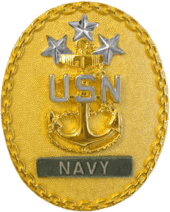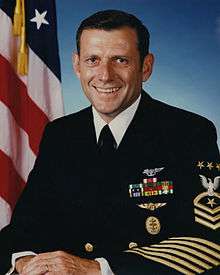Duane R. Bushey
| Duane R. Bushey | |
|---|---|
|
7th Master Chief Petty Officer of the Navy | |
| Born |
May 3, 1944 Lebanon, New Hampshire |
| Allegiance | United States of America |
| Service/branch | United States Navy |
| Years of service | 1962–1992 |
| Rank |
|
| Commands held | Master Chief Petty Officer of the Navy |
| Awards |
Navy Distinguished Service Medal Meritorious Service Medal Navy Commendation Medal Navy Achievement Medal |
Duane R. Bushey (born May 3, 1944) was the seventh Master Chief Petty Officer of the Navy.[1][2] Following graduation from Wicomico High School in Salisbury, Maryland, he enlisted in the United States Navy in June 1962.
Master Chief Bushey received recruit training at the Naval Training Center in Great Lakes, Illinois, and completed Aviation Electrician "A" school in Jacksonville, Florida. He first saw duty at the naval Air Test Facility at the Naval Air Station in Patuxent River, Maryland, followed by further technical training in an advanced electronics “B” school. He then served on board the aircraft carrier USS Kearsarge (CVS-33), with two follow-on tours as a flight instructor for fleet replacement navigators with Heavy Attack Squadron 123 at the Naval Air Station, Whidbey Island, Washington and Tactical Electronic Warfare Squadron 130 at the Naval Air Station in Alameda, California, where he served as Celestial and Radar Navigation Instructor.
Master Chief Bushey then served as the Assistant Aircrew Division Officer for the Aircraft Ferry Squadron Thirty One in Norfolk, Virginia. While serving with VRF-31, he qualified as an overwater navigator in several aircraft, as flight engineer for P-3 Orion aircraft and bombardier/navigator for A-6 Intruder aircraft.
Master Chief Bushey was selected to attend the U.S. Army Sergeants Major Academy in Fort Bliss, Texas in January 1980 and while there received the General Ralph E. Hanes Jr. Award for outstanding research. Following graduation in July 1980 he returned to VRF-31 as Command Master Chief, deploying aboard USS Theodore Roosevelt (CVN-71). On September 9, 1988, Master Chief Bushey became the seventh Master Chief Petty Officer of the Navy. He has accumulated more than 6,000 flying hours and made more than 400 carrier landings.
Awards and decorations
| Enlisted Aviation Warfare Specialist insignia | |
| Naval Aircrew Warfare Specialist insignia | |
 |
Master Chief Petty Officer of the Navy Identification Badge |
| Navy Distinguished Service Medal | |
| Meritorious Service Medal with one gold award star | |
| Navy and Marine Corps Commendation Medal with award star | |
| Navy and Marine Corps Achievement Medal | |
| Navy Meritorious Unit Commendation with two service stars | |
| Navy "E" Ribbon with two Battle E devices | |
| Navy Good Conduct Medal with one silver and one bronze service stars | |
| National Defense Service Medal with service star | |
| Armed Forces Expeditionary Medal | |
| Vietnam Service Medal with three service stars | |
| Vietnam Campaign Medal |
- 7 gold Service Stripes.
References
- ↑ http://www.history.navy.mil/faqs/faq46-8.htm
- ↑ Naval aviation news. Chief of Naval Operations. September 1992. p. 38.
http://www.quarterdeck.org/WindsOfChange/111-129%20MCPON%20Bushey.htm
| Military offices | ||
|---|---|---|
| Preceded by William H. Plackett |
7th Master Chief Petty Officer of the Navy SEP 9, 1988 – AUG 28, 1992 |
Succeeded by John Hagan |
